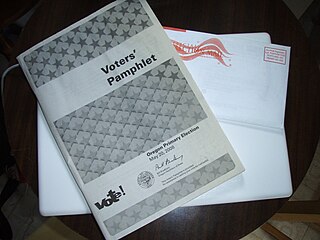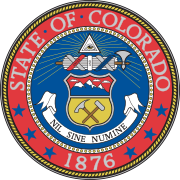
The Equal Rights Amendment (ERA) is a proposed amendment to the United States Constitution designed to guarantee equal legal rights for all American citizens regardless of sex. It seeks to end the legal distinctions between men and women in matters of divorce, property, employment, and other matters. The first version of an ERA was written by Alice Paul and Crystal Eastman and introduced in Congress in December 1923.

The Twenty-third Amendment to the United States Constitution extends the right to vote in presidential elections to citizens residing in the District of Columbia. The amendment grants the district electors in the Electoral College as though it were a state, though the district can never have more electors than the least-populous state. The Twenty-third Amendment was proposed by the 86th Congress on June 16, 1960, and was ratified by the requisite number of states on March 29, 1961.

The Twenty-fourth Amendment of the United States Constitution prohibits both Congress and the states from conditioning the right to vote in federal elections on payment of a poll tax or other types of tax. The amendment was proposed by Congress to the states on August 27, 1962, and was ratified by the states on January 23, 1964.
A constitutional amendment is a modification of the constitution of a polity, organization or other type of entity. Amendments are often interwoven into the relevant sections of an existing constitution, directly altering the text. Conversely, they can be appended to the constitution as supplemental additions (codicils), thus changing the frame of government without altering the existing text of the document.
Romania does not allow same-sex marriage or civil unions, though it does recognise the right of residence of same-sex married couples if one partner is an EU citizen. As a result of a ruling of the European Court of Justice in June 2018, same-sex married partners of EU citizens must be recognised for the purpose of establishing a right of residency in Romania.

The Mississippi Republican Party is the state affiliate of the United States Republican Party. The party chairman is Lucien Smith and is based in Jackson, Mississippi. The original Republican Party of Mississippi was founded following the American Civil War, the current incarnation of the Mississippi Republican Party was founded in 1956. The party would grow in popularity during the 1960s with wedge issues such as the 1964 Civil Rights Act, and today the party has the majority in the state.

The Civil Rights Act of 1960 is a United States federal law that established federal inspection of local voter registration polls and introduced penalties for anyone who obstructed someone's attempt to register to vote. It was designed to deal with discriminatory laws and practices in the segregated South, by which blacks and Mexican Texans had been effectively disenfranchised since the late 19th and start of the 20th century. It extended the life of the Civil Rights Commission, previously limited to two years, to oversee registration and voting practices. The act was signed into law by President Dwight D. Eisenhower and served to eliminate certain loopholes left by the Civil Rights Act of 1957.
The Human Life Amendment is the name of multiple proposals to amend the United States Constitution that would have the effect of overturning the Supreme Court 1973 decision Roe v. Wade, which ruled that prohibitions against abortion were unconstitutional. All of these amendment proposals seek to overturn Roe v. Wade, but most of them go further by forbidding both Congress and the states from legalizing abortion. Some of the proposals define human life as beginning with conception or fertilization.

The Reconstruction Amendments are the Thirteenth, Fourteenth, and Fifteenth amendments to the United States Constitution, adopted between 1865 and 1870, the five years immediately following the Civil War. The last time the Constitution had been amended was with the Twelfth Amendment more than 60 years earlier in 1804. The Reconstruction amendments were a part of implementing the Reconstruction of the American South after the war. Their proponents saw them as transforming the United States from a country that was "half slave and half free" to one in which the constitutionally guaranteed "blessings of liberty" would be extended to the entire populace, including the former slaves and their descendants.
Missouri Constitutional Amendment 2 was a state constitutional amendment initiative that concerned stem cell research and human cloning. It allows any stem cell research and therapy in Missouri that is legal under federal law, including somatic cell nuclear transfer to produce human embryos for stem cell production. It prohibits cloning or attempting to clone a human being, which is defined to mean "to implant in a uterus or attempt to implant in a uterus anything other than the product of fertilization of an egg of a human female by a sperm of a human male for the purpose of initiating a pregnancy that could result in the creation of a human fetus, or the birth of a human being". Commercials supporting and opposing the amendment aired during the 2006 World Series, in which the St. Louis Cardinals participated. The issue became especially intertwined with the 2006 U.S. Senate election in Missouri, with the Republican and Democratic candidates on opposite sides of the issue.

The Constitution of Belize is the supreme law of the nation of Belize. It was signed on September 1981 with effect from that date.

On November 4, 2008, the U.S. state of Oregon held statewide general elections for three statewide offices, both houses of the Oregon Legislative Assembly, and twelve state ballot measures. The primary elections were held on May 20, 2008. Both elections also included national races for President of the US, US Senator, and US House Representatives. Numerous local jurisdictions — cities, counties, and regional government entities — held elections for various local offices and ballot measures on these days as well.
The recent politics of Colorado, United States, are that of a state considered a swing state.

Amendment 47 was a proposed initiative on the Colorado ballot for 2008. It was defeated.
Abortion in the United States is legal via the landmark 1973 case of Roe v. Wade. Specifically, abortion is legal in all U.S. states, and every state has at least one abortion clinic. However, individual states can regulate/limit the use of abortion or create "trigger laws", which would make abortion illegal within the first and second trimesters if Roe were overturned by the Supreme Court of the United States Also, nine states—Alabama, Arizona, Arkansas, Michigan, Mississippi, New Mexico, Oklahoma, West Virginia and Wisconsin still have their unenforced pre-Roe abortion bans on the lawbooks, which could start being enforced if Roe were overturned. In accordance with the US Supreme Court case of Planned Parenthood v. Casey (1992), states cannot place legal restrictions posing an undue burden for "the purpose or effect of placing a substantial obstacle in the path of a woman seeking an abortion of a nonviable fetus."

The Constitution of Barbados is the supreme law under which Barbados is governed. The Constitution provides a legal establishment of the structure and various roles of administration of the Queen of Barbados, the Government of Barbados, as well as legal rights and responsibilities of the public and various other government officers. The Constitution which came into force in 1966 was amended in 1974, 1978, 1990, 1992, 1995, 2002, and 2003. The 1966 document succeeds several other documents concerning administration of Barbados. One of them, the Barbados Charter, is discussed in the present Constitution's Preamble. Prior statutes were created for the administration of Barbados as a colony. As a former English and later British colony, the Constitution is similar to those of other Commonwealth realms, yet distinctly different in the spirit of the Statute of Westminster. In recent years there has been some dialogue on whether Barbados should undertake a process of patriating the constitution to cease the foundation being a 1966 Act of the British House of Commons.
Personhood is the status of being a person. Defining personhood is a controversial topic in philosophy and law and is closely tied with legal and political concepts of citizenship, equality, and liberty. According to law, only a natural person or legal personality has rights, protections, privileges, responsibilities, and legal liability.

Colorado Amendment 62 was an initiated constitutional amendment that appeared on the November 2, 2010 ballot defining personhood as “every human being from the beginning of the biological development of that human being.” It sought to ban abortion in the state of Colorado and challenge Roe v. Wade.
Abortion in Colorado is legal. 59% of adults said in a poll by the Pew Research Center that abortion should be legal in all or most cases. In 1962, the American Law Institute published their model penal code as it applied to abortions with three circumstances where they believed a physician could justifiably perform an abortion. A version of this was enacted into law in 1967. Colorado became the first state to decriminalize abortion in cases of rape, incest, or in which pregnancy would lead to permanent physical disability of the woman. The Colorado Amendment 48 initiative was proposed in 2008 jointly by Kristine Burton and Michael Burton of Colorado for Equal Rights. Colorado Right to Life supported the amendment. This abortion restriction law did not pass after it met a lot of opposition. In 2013, 2014, 2015, 2016, 2017 and 2018, the state legislature had attempts to ban abortion that all failed.








